 MyDogBreeds
MyDogBreeds Fruggle is originated from United States but Bloodhound is originated from United Kingdom. Fruggle may grow 18 cm / 7 inches shorter than Bloodhound. Fruggle may weigh 59 kg / 130 pounds lesser than Bloodhound. Fruggle may live 7 years more than Bloodhound. Fruggle may have less litter size than Bloodhound. Fruggle requires Moderate maintenance. But Bloodhound requires Low maintenance
Fruggle is originated from United States but Bloodhound is originated from United Kingdom. Fruggle may grow 18 cm / 7 inches shorter than Bloodhound. Fruggle may weigh 59 kg / 130 pounds lesser than Bloodhound. Fruggle may live 7 years more than Bloodhound. Fruggle may have less litter size than Bloodhound. Fruggle requires Moderate maintenance. But Bloodhound requires Low maintenance
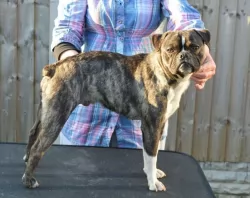 The Fruggle is a mixed breed/hybrid crossover between a Pug and a French Bulldog. The “Frug” is considered a designer breed, developed in the United States and growing in popularity. These hybrid dogs all can be different taking their looks and characteristics from one or both of the parent dogs in different ways. Within the same litter you can have pups that look like pugs and act like French Bulldogs or look like French Bulldogs and act like pugs.
The Fruggle is a mixed breed/hybrid crossover between a Pug and a French Bulldog. The “Frug” is considered a designer breed, developed in the United States and growing in popularity. These hybrid dogs all can be different taking their looks and characteristics from one or both of the parent dogs in different ways. Within the same litter you can have pups that look like pugs and act like French Bulldogs or look like French Bulldogs and act like pugs.
Also known as a Frenchie Pug, the hybrid is growing in popularity and new to the United Kingdom but recognized by the American Canine Hybrid Club. It is not recognized by the AKC or American Kennel Club. They are developed from purebred dogs but are not a purebred breed at this time. It would take generations of breeding true for that to happen. At the same time the Fruggle is an adorable little dog with characteristics of both its purebred parents.
The French Bulldog is a descendent of dogs that lived with ancient Greeks, the Molossians Phoenician traders spread the dog throughout the known world. These dogs were used in dogs fights and sporting until 1835 when these were outlawed. The Frenchie became a companion dog for the ladies of Paris, writers, artists and fashion designers. The Pug, on the other hand, can trace their history as far back as Confucius in 700BC. They are one of the most ancient dog breeds in existence today. They were the property of the Imperial Family in China, guarded by soldiers. Stealing a pug in Imperial China was punishable by death.
There is no real history or the Fruggle as it is too young in its existence as a separate type of dog. It is considered a breed – just a hybrid breed. In addition to the American Canine Hybrid Club, it is also recognized by the International Designer Canine Registry, the Designer Breed Registry, the Dog Registry of America and the Designer Dogs Kennel Club.
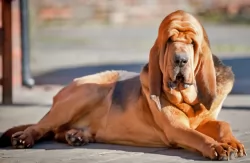 The history of the Bloodhound breed is a fascinating one. Known as a Sleuthhound for its ability to smell out the culprit and bag the prey. Even more so the Bloodhound is known for tracking and finding lost people. He is famous for finding human scents and being able to follow them even days or weeks after the person is lost. They are also able to track people over a great amount of land and have been known to successfully track escaped prisoners or wanted criminals. They are descended from the Saint-Hubert Hounds that were bred at the Abbey/Monastery at Saint-Hubert, Belgium. According to the legends the St. Hubert hounds were bred by the Monks in 1000AD. This hound was thought to be a mixed breed rather than a purebred. That’s because the ancestry of this hound is not really known but it is known that the monks bred them and sent several to the King of France annually. Only black hounds were gifted.
The history of the Bloodhound breed is a fascinating one. Known as a Sleuthhound for its ability to smell out the culprit and bag the prey. Even more so the Bloodhound is known for tracking and finding lost people. He is famous for finding human scents and being able to follow them even days or weeks after the person is lost. They are also able to track people over a great amount of land and have been known to successfully track escaped prisoners or wanted criminals. They are descended from the Saint-Hubert Hounds that were bred at the Abbey/Monastery at Saint-Hubert, Belgium. According to the legends the St. Hubert hounds were bred by the Monks in 1000AD. This hound was thought to be a mixed breed rather than a purebred. That’s because the ancestry of this hound is not really known but it is known that the monks bred them and sent several to the King of France annually. Only black hounds were gifted.
Some kings preferred not to hunt with these hounds thinking them not good enough while others thought the only use for them was as a leash hound. All described the St. Hubert as long in body with short legs. These gifts continued until the French Revolution when hunting in France was greatly reduced until the 19th century. The original St. Hubert strain became extinct in the 19th century and that the current European St. Hubert hound has its origins in the Bloodhound. The Bloodhound as a separate breed was already established in Europe by the middle of the 14th century. They were used as leach hounds to sniff out the prey so that the pack hounds could chase and keep it “at bay”. They were also used from the beginnings of the breed to track humans. At this time they were often known as sleuth hounds. As recorded by John Caius – the authority on Bloodhounds from their origins – writes about the breeds ability to find and track the scent of blood – thus becoming the Bloodhound and its use to track poachers and thieves. He also reported that the Bloodhound and the Sleuth Hound were the same basic breed. The number of Bloodhounds in Britain gradually declined until few remained after World War II. Britain has gradually built their breed back up by importing dogs from America. It was during the 19th century that the Bloodhound was imported into France by breeders who wished to reestablish the St. Hubert Hound. Thus the St. Hubert is both the ancestor and descendent of the Bloodhound. The Britain’s continue to believe that the Bloodhound is a native British breed.
The Bloodhounds in America have had great success as companion animals, with police departments and forest rangers and showing in the prestigious Westminster Kennel Club in New York. There are more Bloodhounds in the United States than anywhere else in the world.
In the end the Anglo-Saxton Bloodhound cannot be specified with any real certainty. Many believe it was not the St. Hubert that the Bloodhound descended from but rather the Norman hound or the sleuth-hound. Many believe it could have included other breeds such as the southern hound, the dun-hound and the Talbot. It cannot be proven today it the Bloodhound’s origins come from Belgian or England.
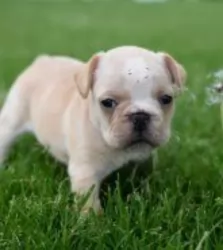 Being a designer dog, the appearance and characteristics of the Fruggle varies from pup to pup. Most do have flat faces, large eyes, and short muzzles. The Frug is a short, sturdy and compact dog. Their tail is over the back in a tight curl, and the ears are round and large. They are called Rose Ears. The nose and eyes are black or very dark and they have wrinkles on the forehead. This is the basic generalization of a mix between the Pug and the French Bulldog. The reality is they are all different. Most often they have a Pugs face with the French Bulldogs ears. They are a little smaller than the French Bulldog and a little larger than the Pug. Their hair is fine, glossy, smooth and short.
Being a designer dog, the appearance and characteristics of the Fruggle varies from pup to pup. Most do have flat faces, large eyes, and short muzzles. The Frug is a short, sturdy and compact dog. Their tail is over the back in a tight curl, and the ears are round and large. They are called Rose Ears. The nose and eyes are black or very dark and they have wrinkles on the forehead. This is the basic generalization of a mix between the Pug and the French Bulldog. The reality is they are all different. Most often they have a Pugs face with the French Bulldogs ears. They are a little smaller than the French Bulldog and a little larger than the Pug. Their hair is fine, glossy, smooth and short.
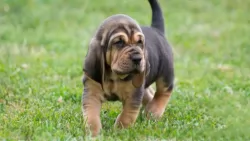 When being judged for confirmation in a show ring, the preference is for a larger dog, with an unusual skeleton in respect to its large size and heavy weight in the bones. They have a narrow head, flat at the sides, but long. They have deep set eyes buried in the deep, long face and wrinkles. The eyes might be yellow or run the gamut to deep hazel depending upon the color of the dog. The long velvety ears and thin and low set on the head. These long ears are as much a part of the Bloodhounds Olfactory system as his amazing nose. They curl backward and inward as the ends. There is a large amount of loose skin on the head and at the jowls. When the Bloodhound lowers his head the loose folds and ridges of skin are prominent on the face and forehead.
When being judged for confirmation in a show ring, the preference is for a larger dog, with an unusual skeleton in respect to its large size and heavy weight in the bones. They have a narrow head, flat at the sides, but long. They have deep set eyes buried in the deep, long face and wrinkles. The eyes might be yellow or run the gamut to deep hazel depending upon the color of the dog. The long velvety ears and thin and low set on the head. These long ears are as much a part of the Bloodhounds Olfactory system as his amazing nose. They curl backward and inward as the ends. There is a large amount of loose skin on the head and at the jowls. When the Bloodhound lowers his head the loose folds and ridges of skin are prominent on the face and forehead.
For many centuries all different colors of Bloodhounds could be found. Today however they are pretty much red, black and tan and black and liver. The Bloodhound is a powerful dog and is larger than most breeds of hounds.
 The Fruggle is very child friendly
The Fruggle is very child friendly
The Fruggle is a good watchdog and can be taught many tricks.
He is not very adaptable. He can live in city and in apartments much better than in the country or on farms. He needs air conditioning
Is very high as the Fruggle is very intelligent
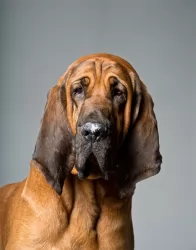 The Bloodhound is known as a gentle soul and he truly is. They are affectionate and gentle with people and children. However, their strong will to track can make them stubborn and hard to handle and train. They are easy going dogs and really like to be with people, children and other dogs. They are affectionate but tend to be set in their ways.
The Bloodhound is known as a gentle soul and he truly is. They are affectionate and gentle with people and children. However, their strong will to track can make them stubborn and hard to handle and train. They are easy going dogs and really like to be with people, children and other dogs. They are affectionate but tend to be set in their ways.
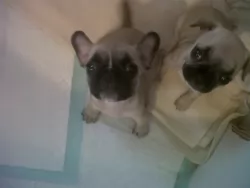 The Fruggle can inherit any of the health issues of either parent or they might be healthier than either parent. Some of the issues that the Fruggle might face include:
The Fruggle can inherit any of the health issues of either parent or they might be healthier than either parent. Some of the issues that the Fruggle might face include:
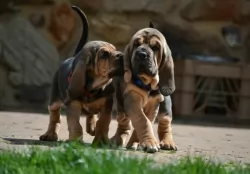 Obviously with ears like the Bloodhound there is always a chance for problems and serious infections. The ears need to be cleaned daily. Because their coat is so thick, they can overheat easily, and they are very prone to bloat, as are many large animals. However, with the Bloodhound, Bloat is the number one killer. Their lifespan is one of the shortest of all dogs at 6.75 years.
Obviously with ears like the Bloodhound there is always a chance for problems and serious infections. The ears need to be cleaned daily. Because their coat is so thick, they can overheat easily, and they are very prone to bloat, as are many large animals. However, with the Bloodhound, Bloat is the number one killer. Their lifespan is one of the shortest of all dogs at 6.75 years.
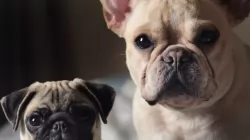 1/2 cup should be fed daily in two to three meals of high quality dry puppy food
1/2 cup should be fed daily in two to three meals of high quality dry puppy food
1/2 to 2 cups should be fed daily in two meals of high quality dry adult food
Quite often the first generation hybrid has much better health than either of the founding breeds. The same is not true of the second and third generations.
The Fruggle is a laid back dog requiring very little exercise. A daily walk or rolling a ball around the apartment is enough for him. The Fruggle should NOT be exercise vigorously or excessively due to its smashed face and Brachycephalic Syndrome. Weekly visits to a dog park would be sufficient as well. Do not take him out in excessive cold or heat.
 The Bloodhound is not a high energy, fast moving dog but that does not mean he doesn’t have serious nutritional needs. An overweight Bloodhound is on a course to an early demise. They should be fed a high-quality food once a day or split into two daily servings. Do not feed them right before or right after strenuous exercise and remember that strenuous exercise for a Bloodhound is considerably less than it is for a terrier.
The Bloodhound is not a high energy, fast moving dog but that does not mean he doesn’t have serious nutritional needs. An overweight Bloodhound is on a course to an early demise. They should be fed a high-quality food once a day or split into two daily servings. Do not feed them right before or right after strenuous exercise and remember that strenuous exercise for a Bloodhound is considerably less than it is for a terrier.
As previously mentioned the number one cause of death in Bloodhounds is Bloat. They are also prone to cancer. They have minor issues with their eyes, but their ears and skin are also major concerns. Clean the ears daily and wipe out the skin folds and wrinkles to prevent infections. They should be test for hip and elbow dysplasia simply because they are large dogs, though these conditions are less common in Bloodhounds.
Though the Bloodhound is known as a couch potato his stamina and activity levels are usually greatly underestimated. He can follow a scent for 7-10 hours over miles of terrain with out a problem. He needs daily exercise such as long walks on a leash. Do not take your Bloodhound out off leash because if he picks up a scent and wanders off you will not be able to get his attention to call him back.